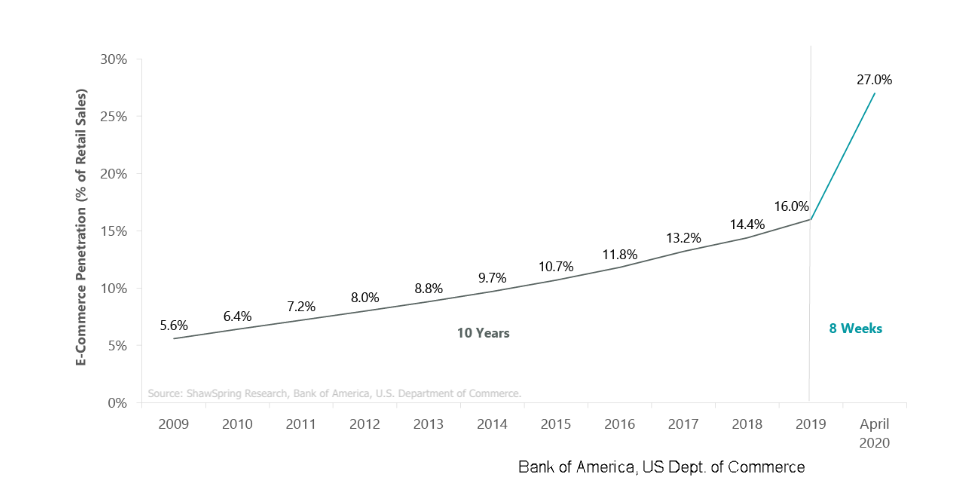If one is looking for an image to encapsulate the Covid-19 “Slingshot” phenomenon, you will find an embarrassment of riches. But this has to be one of our favorites.
In 8 weeks–a heartbeat in a human lifetime–the penetration of online retail increased by 11 percentage points, or 69%. It took from 1994 and the first online e-commerce transaction to get from zero to the first 11 percentage point share in 2016–22 years, or nearly two and a half decades. (The ratio of 22 years to 8 weeks is 143:1.)
Other examples are all around us. According to McKinsey, in “The CEO moment: Leadership for a new era” (July 2020), Cincinnati Children’s Hospital Medical Center scheduled 2,000 telehealth visits in 2019; it’s now taking care of 5,000 a week (a ratio of 132:1). In Dubai, the conglomerate MAG shifted 1,000 suddenly idled ushers and ticket-takers at its movie theaters into clerks for its online grocery arm–in two days. Best Buy had been gingerly testing curbside pickup at a handful of pilot stores–before rolling it out to every store in its network in (yes) two days. It took Unilever twice as long (four days) to convert manufacturing lines making deodorant into making hand sanitizer.
These rapid-fire adaptations vindicate what an unidentified CFO told McKinsey last month about shifting resources: “What I thought would never be possible, I can now do in two weeks.”
CEO’s from a variety of industries are thinking hard about what changes Covid-19 opens up.
A classic strategy consulting question–because it’s truly a good question–has long been, “What would a complete outsider do?”
Now you have a once-in-a-lifetime chance to ask yourself “What’s your Covid-19 answer?” Both Lance Fritz of Union Pacific and Vivek Sankaran of Albertsons (I promised you a variety of industries) realized that zero-commuting/remote work and zero business travel have freed up wide blocks of time. They aspire to use it to focus more on what’s long-run important, not what’s short-term urgent. This may seem obvious. but it was every bit as obvious six months ago. Dare I ask what you did about it then? Don’t waste this chance too.
Nor are CEO’s coming to monolithic conclusions about things. Alan Jope, CEO of Unilever, and Natarajan Chandrasekaran, Chair of the Tata Group, have realized with a start what a “capacity trap” travel is. For both of them, this led to a “quite calming sense of control.” But Larry Fink, CEO of BlackRock, reports the opposite reaction:
[He] discovered early in the crisis that not having travel time took from [the firm] valuable reflection, focus, and restoration time. Fink reminds us that downtime at the water cooler with colleagues and travel by oneself can be creative openings and outlets for new thinking. Many CEOs have since adapted by booking “flight time” into their schedule so as to avoid spending all day, every day, on video conference meetings. In either case, the COVID-19 experience has made it clearer than ever that CEOs must be extremely intentional about how they use their time.
Critical is recognizing that whereas “leadership” six months ago was defined as and viewed through the lenses of strategy, business, culture, and people, now it’s as much more or more about morale, which means truly listening and connecting with people, and admitting your own vulnerabilities.



